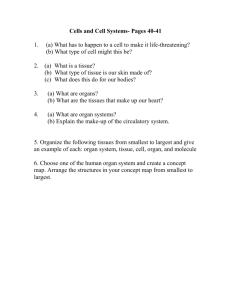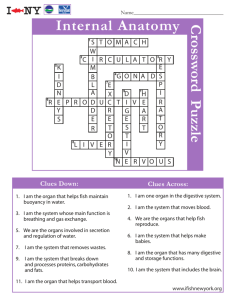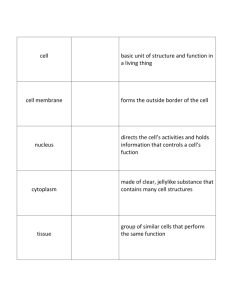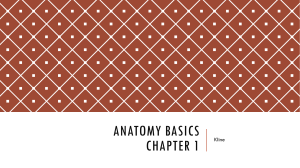5 Levels of Organization
advertisement
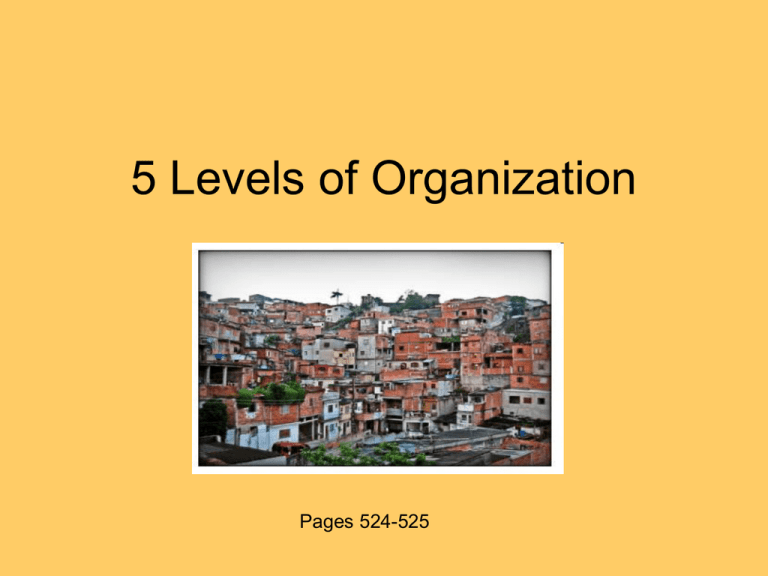
5 Levels of Organization Pages 524-525 5 Levels of Organization Cells Tissues Organs Organ Systems Organism Cells • Cells are the smallest level of organization in living things. Tissue • Cells + Cells = Tissue • There are 4 types of tissue in your body: – – – – Connective (bone, blood) Nerve Epithelial (skin, linings) Muscle Organ • Tissue + Tissue = Organ • Organs are what we usually think about when we think about parts of the body Organ • Connective tissue makes up organs like the bones, blood vessels, tendons, ligaments, etc… Organ • Nerve Tissue Makes up organs like the brain, spinal cord, and nerves. Organ • Epithelial Tissue makes up organs like the skin, hair, and fingernails Organ • Muscle tissue makes up organs like the heart, stomach, kidneys, lungs, biceps, etc… Organ System • Organ + Organ = Organ System • You have 11 organ systems in your body. 11 organ systems of the body Organ Systems • 1- Integumentary System • The integumentary system is a temperature regulator, sensory system, and protects the organism. (first line of defense.) • Skin, hair, and fingernails are some organs that make up the integumentary system. Organ Systems • Integumentary system facts: – Skin is the largest organ in your body. – Skin is 16% of your body weight – You completely replace your skin cells about once per month. – About 90% of dust in your house is dead skin cells. – Hair is the fastest growing organ in the body – Average #s of hairs: • redheads= 80,000 • Brown/black = 100,000 • Blondes = 120,000 – Fingernails grow faster during the summer and on your dominant hand. Organ Systems • How would your life be different without your integumentary system? • How long do you think you could survive? Organ Systems • 2- Muscular system • The muscular system allows us to move • Biceps, triceps, hamstring, and quadriceps, are all organs in the muscular system. Organ Systems • Muscular system facts: – The busiest muscles in your muscular system are your eyes. They move more than 100,000 times per day! – The largest muscle in your body is the gluteus maximus – It takes 17 muscles to smile and 42 to frown. – Muscles can’t push, they can only pull. – Muscles can’t function without calcium. Organ Systems • How would your life be different without your muscular system? • How long do you think you could survive? Organ Systems • 3- Skeletal system • The skeletal system provides support and protection for vital organs. • Bones, ligaments, and tendons are some organs that make up a skeletal system. Organ Systems • Skeletal system facts: – Your body has about 206 bones although you were born with over 300 bones. – You have the same number of bones in your neck as a giraffe does! – Bone marrow makes blood cells, but bones are alive, and would die without blood. – The longest bone in your body is your femur. (Thigh) – Your bones are about 60% calcium compounds. – Over half of the bones in your entire body are in your hands and feet. Organ Systems • How would your life be different without your skeletal system? • How long do you think you could survive? Organ Systems • 4- Nervous system • The nervous system sends messages that control body functions • The brain, spinal cord, and nerves are some organs in the nervous system. Organ Systems • Nervous system facts: – Your nervous system functions using electricity. – Messages can travel through your neurons at speeds of 250 mph! – The avg. # of neurons in a human brain is 100 billion. – The longest neuron (nerve cell) known to man is 15 feet long (in a giraffe leg). – If you lined up all the neurons in your body, it would stretch 600 miles! – An adult human brain weighs about 3 pounds. Organ Systems • How would your life be different without your nervous system? • How long do you think you could survive? Organ Systems • 5- Endocrine System • The endocrine system produces chemicals that control the body (ex. Hormones) • The adrenal glands, pituitary gland (in brain), thyroid, and pancreas are all organs in the endocrine system. Organ Systems • Endocrine system facts: – Steroids, insulin, and adrenaline are 3 of the 30 hormones made by your body. – It only takes a tiny bit of a hormone to cause a very large reaction – Physical growth, hyperactivity, depression, stress, hunger and many other emotions are linked to hormone production. Organ Systems • How would your life be different without your endocrine system? • How long do you think you could survive? Organ Systems • 6- Cardiovascular system (circulatory) • The cardiovascular system carries food and oxygen to the cells, and carries carbon dioxide away from the cells. • Your heart, arteries, veins, and capillaries, are organs in the cardiovascular system. Organ Systems • Cardiovascular system facts: – The heart beats about 3,000,000,000 times during an average lifetime. – You have thousands of miles of blood vessels and arteries in your body. (you could wrap them around the world twice. – You have about 5 million red blood cells, 10,000 white blood cells, and 250,000 platelets in 1 drop of blood. – Arteries take blood away from the heart, and veins return it to the heart. – Moving helps return blood to your heart – You do NOT have blue blood! Organ Systems • How would your life be different without your cardiovascular system? • How long do you think you could survive? Organ Systems • 7- Lymphatic system (Immune system) • The lymphatic system returns leaked fluids to blood vessels, and helps fight off germs. • Lymph nodes, lymph vessels, thymus, spleen, and tonsils are all organs in the lymphatic system. Organ Systems • Lymphatic system facts: – Your lymph system releases white blood cells to fight off infection. – Your lymph nodes swell up when the fill up with white blood cells (when you are sick) – Your spleen helps break down and recycle RBCs. – Your lymph system returns about ½ cup of lymph fluid to the heart per hour. – Domestic birds don’t have lymph nodes. – Most of your lymph nodes are in your armpits, neck, and groin. Organ Systems • How would your life be different without your lymph system? • How long do you think you could survive? Organ Systems • 8- Respiratory system • The respiratory system exchanges oxygen for carbon dioxide. (O2 in and CO2 out). • Lungs, Bronchi, trachea, and diaphragm are all organs in the respiratory system. Organ Systems • Respiratory system facts: – You breathe in 21% oxygen and .4% Carbon dioxide, you breathe out 16% oxygen and 4% carbon dioxide. – You have the same surface area on you lungs as a tennis court. – You breathe out about ½ of a liter of water per day. – Your right lung is slightly larger than your left. Organ Systems • How would your life be different without your respiratory system? • How long do you think you could survive? Organ Systems • 9- Digestive System • The digestive system breaks food down into nutrients that can be absorbed by the body. • The mouth, liver, stomach, and intestines are some of the organs in the digestive system. Organ Systems • Digestive system facts: – The average stomach can hold about 1.5 liters of food. – Your intestines are lined with tiny projections called villi. They increase the surface area of your intestines so you can absorb as much as possible. – Your intestines are about 15 meters long! – Food stays in your stomach for 2-4 hours. Organ Systems • How would your life be different without your digestive system? • How long do you think you could survive? Organ Systems • • • 10- Urinary System (excretory) The urinary system removes waste from the blood and regulates body fluids. Kidneys, ureters, and the bladder are all organs in the urinary system. Organ Systems • Urinary system facts: – Your bladder can hold about 400 ml of urine. – The blood in your body passes through each kidney 400 times per day. – The kidneys use osmosis to control the amount of water in the blood. – Caffeine and alcohol are diuretics, which means that they suppress the part of your brain that tells your body that you need to retain water. (increases urination - dehydration) Organ Systems • How would your life be different without your urinary system? • How long do you think you could survive? Organ Systems • 11- Reproductive system • The reproductive system enables the organism to produce offspring • Ovaries and uterus in a female and testes in a male are organs in the reproductive system. Organ Systems • Reproductive system facts: – The largest cell in the human female body is the egg in the ovaries. – An adult male makes about 500 million sperm per day. A female is born with about 600,000 immature eggs. – A female body is capable of giving birth to 35 children in her lifetime. Organ Systems • Which organ system do you think is most important? • Which organ systems couldn’t function without other organ systems? Quiz time! • Which level of organization do each of the following pictures belong to? Quiz time! Quiz time! Quiz time! Quiz time! Quiz time! Quiz time!

